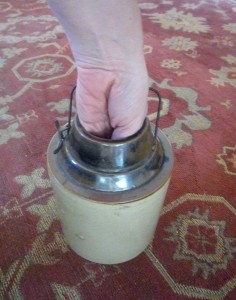Parenting Edition
Those couple of years when my kids were 3 & 1 and 4 & 2, my biggest parenting epiphany was this: have no or low expectations for how the day would go. When I had no expectations — i.e. we could go to the grocery store or not, go to the park or not, the children would play nicely on their own while I got things done or the things weren’t that necessary so I could drop them if need be — the day went well and we were all happy but tired at the end. I had hope that things could get done and small people would nap when I wanted them to, but low expectations of it actually happening.
This mostly had to do with time pressure: if I let go of the idea that certain things had to happen at certain times, and let the day flow, everything went smoother. But it also had to do with the level of the hopes: the more time I spent daydreaming about how well a certain thing was going to go, the more out of control I’d feel when it didn’t go as I’d imagined. And then that out-of-control feeling would compound itself into a really bad day.
I was mostly unsuccessful at this, but it was my goal.
Publishing Edition
But this post isn’t about parenting; it’s about publishing. Every time I send out a query to a new potential agent, I play the same game of high hopes but low expectations.
I love to imagine the agent requesting a full manuscript and loving it and offering representation and they’re the right agent and we do some revisions (because I’m not crazy enough to think the manuscript is perfect) and the agent sends it to the right publisher who buys it and everything goes awesomely and the book finds lots and lots of readers and I’m able to sell my subsequent books and even get interviewed on Fresh Air or any other NPR show that will have me. I even imagine hostile interviews with people who might be upset that I’m making stuff up about biblical characters. Seriously, this is what I do while I’m driving. And I do a fair bit of driving.
At the same time, I’m a realist. I send each packet off, either by snail- or email, knowing it will most likely garner me another rejection. High hopes, low expectations.
There is no external time pressure: the world doesn’t (yet) know it’s clamoring for my stories. But I create the pressure, the wanting it to happen now. Which sucks. Especially the more I let my imagination go on the “high hopes” side.
High Hopes = Vainglory?
At Breathe, the Christian writer’s conference I attended a couple of weeks ago, the final speaker, Sharon Brown, talked about sins that can be traps for writers. One of them was vainglory, which she defined as the “need to maintain an image with a high approval rating … compulsively desiring recognition.” This is different from pride. Pride is being all impressed with yourself because of what you have done. Vainglory is the need for others to be impressed with you.
It’s particularly brutal for the unpublished writer, because you can know that you’ve written a good and satisfying story, but if you want to publish traditionally, you need that approval of others — agents, publishers, reviewers, readers. Even if you self-publish, you need readers to approve enough to buy your book, and your next one, etc.
These needs and compulsive desires supplant the sense of self we are to receive from God. We’re ambitious for our own glory, not for God’s. Which is where I’m all tangled up, because the David and Saul novel is telling a story from the Bible, it was written with loads of prayer, and I’d love for it to drive people back to the original stories. But I need that external approval to make it happen on the scale I think it could happen.
Oh. Did you catch that? I’m making my own problem again. Not only do I want it to happen SOON, I want it to happen BIG. I can almost taste how big it could get.
Hello, vainglory. I am Natalie.
The antidote?
A friend who is a poet has an admirable goal in the next year: she wants to get 100 rejections. Because putting her work out there often enough to collect that many “no’s” means that she’s working every angle she can, and not letting herself get stuck when all those no’s come, which makes it more likely that some yeses will come her way.
I’ve gotten fewer than a dozen rejections in six months on It Is You. I’m not putting it out there enough.
Is repeated rejection the antidote for vainglory? I don’t think so. I think it can make the need for that approval more desperate: the longer it takes, the worse it gets. Somehow, I need to move from high hopes, low expectations, to some hopes, low expectations.
Because the thing about vainglory is that it’s feeding my Resistance to working on the next book. After all, how can I work on the next thing if I don’t know the status of the first thing? And all that picturing my future glory supplants the imagining I used to do about my works in progress.
So what can I do about it, other than pinching myself when I go into that vainglorious daydream place?
1. In November, instead of doing the normal NaNoWriMo novel, I’m going to write 15 pieces of short biblical fiction and post them here. I’m going to take a scene, a moment from the Bible and imaginatively retell it. That should keep my brain way too busy to have time for vainglory. (Also, I’m looking for suggestions — let me know if there’s a story you want me to delve into.)
2. Try the prayer Sharon Brown recommended: “Deliver me from the impulse to impress and make me ambitious for Your glory.”
Amen. May it be so.





